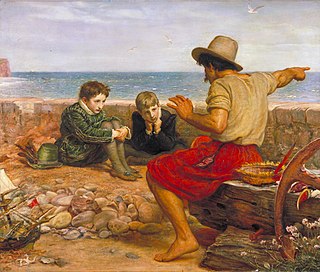
Storytelling is the social and cultural activity of sharing stories, sometimes with improvisation, theatrics or embellishment. Every culture has its own narratives, which are shared as a means of entertainment, education, cultural preservation or instilling moral values. Crucial elements of stories and storytelling include plot, characters and narrative point of view. The term "storytelling" can refer specifically to oral storytelling but also broadly to techniques used in other media to unfold or disclose the narrative of a story.

Donna J. Haraway is an American professor emerita in the history of consciousness and feminist studies departments at the University of California, Santa Cruz, and a prominent scholar in the field of science and technology studies. She has also contributed to the intersection of information technology and feminist theory, and is a leading scholar in contemporary ecofeminism. Her work criticizes anthropocentrism, emphasizes the self-organizing powers of nonhuman processes, and explores dissonant relations between those processes and cultural practices, rethinking sources of ethics.
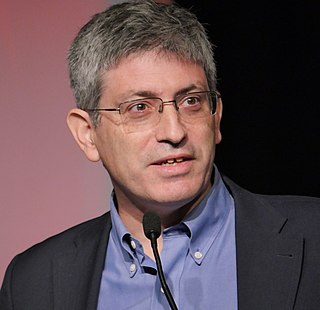
Carl Zimmer is a popular science writer, blogger, columnist, and journalist who specializes in the topics of evolution, parasites, and heredity. The author of many books, he contributes science essays to publications such as The New York Times, Discover, and National Geographic. He is a fellow at Yale University's Morse College and adjunct professor of molecular biophysics and biochemistry at Yale University. Zimmer also gives frequent lectures and has appeared on many radio shows, including National Public Radio's Radiolab, Fresh Air, and This American Life.
The American Institute of Biological Sciences (AIBS) is a nonprofit scientific public charitable organization. The organization's mission is to promote the use of science to inform decision-making and advance biology for the benefit of science and society.

Nalini Nadkarni (1954) is an American forest ecologist who pioneered the study of Costa Rican rain forest canopies. Using mountain climbing equipment to make her ascent, Nadkarni first took an inventory of the canopy in 1981, followed by two more inventories in 1984. She is also known with a characteristic nickname, «the queen of the forest canopy».

Jeremy Bradford Cook Jackson is an American ecologist, paleobiologist, and conservationist. He is an emeritus professor at the Scripps Institution of Oceanography, senior scientist emeritus at the Smithsonian Institution, and visiting scientist at the American Museum of Natural History Center for Biodiversity and Conservation. He studies threats and solutions to human impacts on the environment and the ecology and evolution of tropical seas. Jackson has more than 170 scientific publications and 11 books, with nearly 40,000 citations listed on Google Scholar.
Marine Conservation Institute is a tax-exempt nonprofit ocean conservation organization working to identify and protect vulnerable ocean ecosystems worldwide. The organization is headquartered in Seattle, Washington, with offices in Washington, D.C., and Glen Ellen, California.

Dorceta E. Taylor is an American environmental sociologist known for her work on both environmental justice and racism in the environmental movement. She is the senior associate dean of diversity, equity, and inclusion at Yale School of the Environment, as well as a professor of environmental justice. Prior to this, she was the director of diversity, equity, and inclusion at the University of Michigan's School of Environment and Sustainability (SEAS), where she also served as the James E. Crowfoot Collegiate Professor of Environmental Justice. Taylor's research has ranged over environmental history, environmental justice, environmental policy, leisure and recreation, gender and development, urban affairs, race relations, collective action and social movements, green jobs, diversity in the environmental field, food insecurity, and urban agriculture.

Edmund Soon-Weng Yong is a British-American science journalist and author. In 2021, he received a Pulitzer Prize for Explanatory Reporting for a series on the COVID-19 pandemic. He is the author of two books: I Contain Multitudes: The Microbes Within Us and a Grander View of Life (2016) and An Immense World: How Animal Senses Reveal the Hidden Realms Around Us (2022).

Jacquelyn Gill is a paleoecologist and assistant professor of climate science at the University of Maine. She has worked on such as the relationship between megafauna and vegetation in the Pleistocene, and the sediment cores of Jamaica. Gill is also a science communicator on climate change.

The Story Collider is a US-based non-profit group dedicated to telling true, personal stories about science. Their mission is to empower both scientists and nonscientists alike with the skills they need to tell these stories and share them through their live shows and podcast, with the goal of exploring the human side of science.

Kate Marvel is a climate scientist and science writer based in New York City. She is a senior scientist at Project Drawdown and was formerly an associate research scientist at NASA Goddard Institute for Space Studies and Columbia Engineering's Department of Applied Physics and Mathematics.

The Duke University Marine Laboratory is a research facility and campus of Duke University on Piver's Island, near Beaufort and the Outer Banks, North Carolina specializing in studying marine biology. It is part of the Nicholas School of the Environment's Division of Marine Science and Conservation.
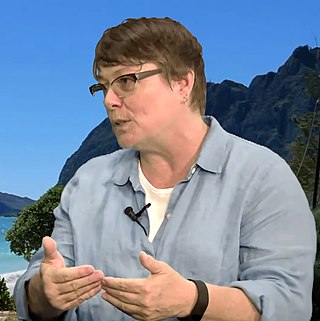
Ruth Deborah Gates was the Director of the Hawaiʻi Institute of Marine Biology and the first woman to be President of the International Society for Reef Studies. Her research was dedicated to understanding coral reef ecosystems, specifically coral-algal symbiosis and the capacity for corals to acclimatize under future climate change conditions. Doctor Gates is most accredited with looking at coral biology and human-assisted coral evolution, known as super corals, as notably seen in the documentary Chasing Coral, available on Netflix.
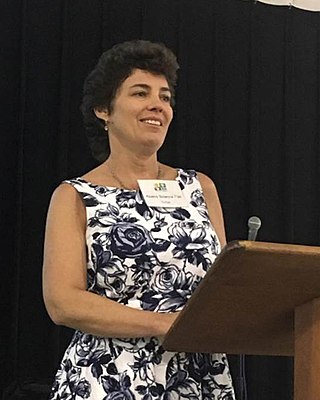
Karen R. Lips is a Professor of Biology at University of Maryland, College Park. Lips' work in the 1990s eventually contributed to the identification of the chytrid fungus as the primary cause of frog decline worldwide.

Climate communication or climate change communication is a field of environmental communication and science communication focused on discussing the causes, nature and effects of anthropogenic climate change.
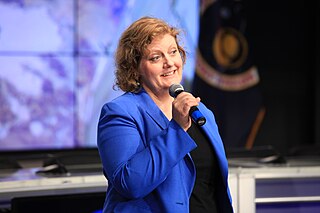
Julie A. Robinson is the Chief Scientist for Human Exploration and Operations at NASA and was previously Chief Scientist for the International Space Station Program for over a twelve years, with a background in both the physical and biological sciences.
Nyawira A. Muthiga is an African conservation zoologist who is Director of the Western Indian Ocean Marine Science Association Marine Programme in Kenya. She is a conservation scientist for the Wildlife Conservation Society.

Christine Figgener is a German marine conservation biologist, author, science communicator, and ocean advocate recognized for her work in sea turtle conservation, the fight against plastic pollution, and the empowerment of women in STEM. She is best known for documenting the removal of a plastic straw from a sea turtle's nose in a YouTube video that went viral in 2015. This video, which was featured in popular media outlets such as National Geographic, HuffPost, The New York Times, ABC News, and CNN, highlighted the dangers of plastic pollution on marine wildlife and was a catalyst for the global anti-straw movement that led to several straw bans by businesses such as Starbucks, Disney, and Alaska Airlines.
Sarah Myhre is a climate scientist who uses geology to analyze ancient marine ecosystems and how they reacted to sudden climate changes in Earth's history. She is also an outspoken advocate for both social justice and science, emphasizing that climate change must be tackled alongside misogyny and social injustice. Myhre strives to help those most affected by climate change, but who lack the platform to speak. Myhre is also a founding board member of 500 Women Scientists, an organization that aims to make science more inclusive.














